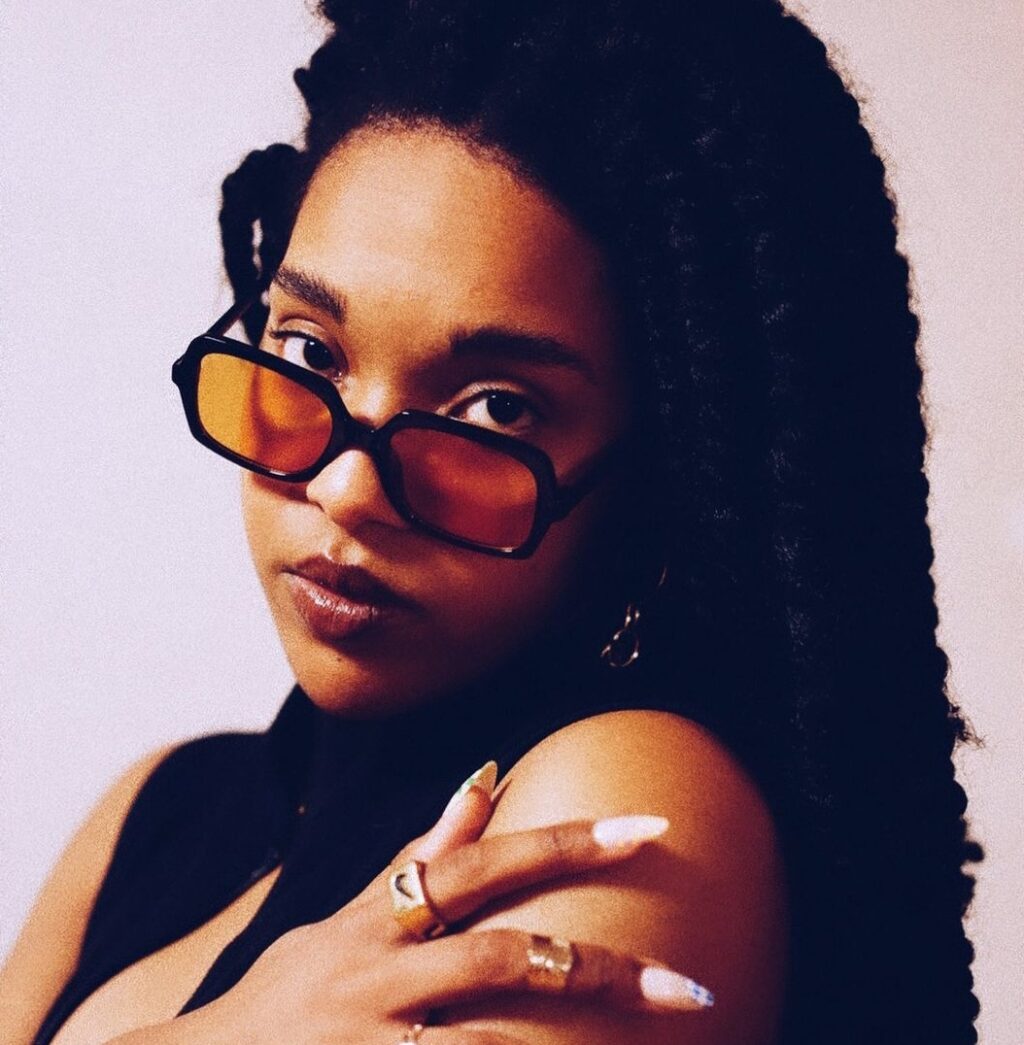- Alex Perry: The Prince of Xperrymental Music
- Porcelain Id: Embracing Multitudes
- Emmanuelle: Harmonies of Identities
While Black History Month is already over in Belgium, KET Magazine continues to celebrate the community that has made it possible for the LGBTQIA+ community to thrive in the series of articles highlighting black queer artists from Brussels/Belgium.
Meet Emmanuelle, a 23-year-old poet and singer-songwriter from Mons. With influences ranging from Etta James to Jungle, her music blends soul, jazz, and hip-hop. In this interview, Emmanuelle shares her journey as she prepares to release her first EP.
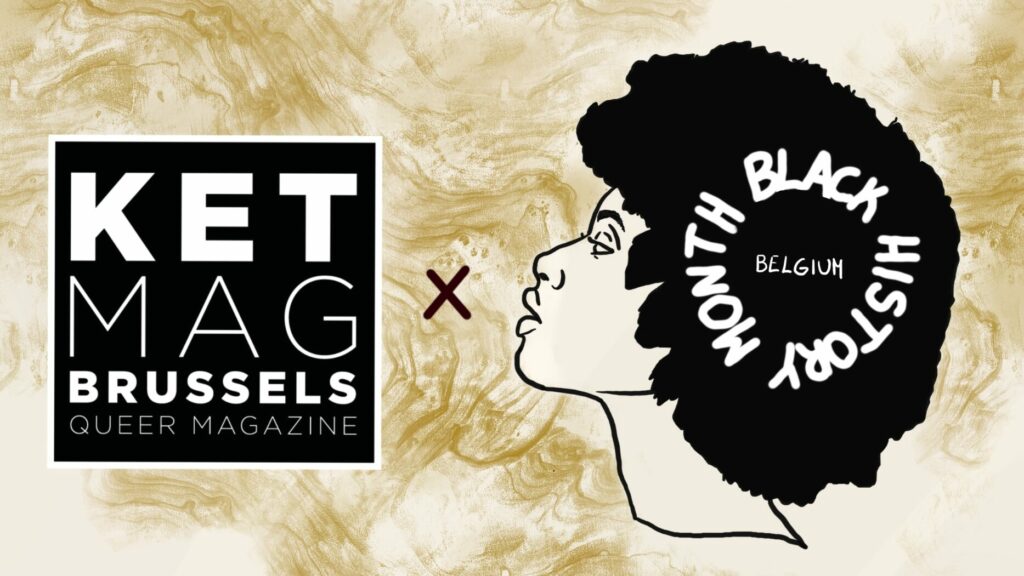
Can you introduce yourself to our readers?
Hello, my name is Emmanuelle. I’m 23 years old and I come from the city of Mons but I’ve been staying in Brussels for a few years now. I am currently studying music in Antwerp. I’m a singer and a songwriter. I have a band which usually performs alongside me. At the moment, I’m in search of more stages to perform on, and I’m also preparing my first EP on the side, to have ready material to bring to those stages.
Speaking of performing on stages, I’ve noted that you do a lot of gigs. How do you generally get them?
Up until now, people usually reached out to me, either because they had watched my covers on Instagram or because they had heard of me through word of mouth. Right now, I’m trying to go up to people more, to see if there are events in the making whose organizers are interested in promoting upcoming artists.
What does music mean to you?
It’s so cliche, but in all honesty, it’s my whole life. When I’m happy, I blast my music really loud and dance to it, and when I’m sad, I put on the kind of music that will make me cry even harder. I find music to be very therapeutic. It dictates the rhythm of my life. I almost always have music playing in the background. It’s a form of expression to me —and one that is so powerful that it transcends even languages. A song in a language that you may not understand can still bring the intended emotions, those the singer wants to share.
What inspired this passion of music and its omnipresence in your life?
I think it all started with Hannah Montana, to be quite honest with you. I used to watch it and think “I want to be a superstar too !” Quite clearly, this dream of becoming a singer originally stems from Disney Channel. Additionally, I grew up in a family where music was an everyday thing; my mom is always singing, my sister is part of a choir, and my brother has perfect pitch despite not doing music himself. Every family reunion was the perfect occasion for a full-on jamming session with my mother’s side of the family. My grandma used to be in a band and my grandpa used to be a saxophonist when he was younger. I think my love of music really comes from this blend of all my experiences growing up.
Does your music reflect that blend of influences ?
Yeah, definitely. As a start, it was a bit of an issue because I had no idea which genre of music to lean more towards. Even today, if you ask me what my preferred genre is, I would not be able to answer. I could probably only tell you which genres did not make the cut. I listen to a bit of everything, from Edith Piaf to Bob Marley. And it all depends on my mood. The difficulty is to find my own self, and my own musical identity through all of it. It’s an ongoing process.
How difficult is it for you to create that musical universe?
I feel like I have to impose restrictions on myself, which can lead to frustration sometimes. I want to tap into so many different genres, especially those that are groovier. In my music business class, a lecturer told us that, to be simply a musician, it’s good to have a variety of genres you can play, so that you can tour with a variety of artists.
However, he added that, to be a singer, you have to be more niche, and find your own genre. Because when you release a project which has, let’s say, ten songs, all those ten songs have to speak to the same target audience, otherwise you risk losing a big part of your following from one song to the next. He insisted that it was especially true when you’re just starting and that, in those moments, it is better to find a theme and stick to it. That is a challenge. I love to get lost in my many influences. I’ve been doing quite a lot of thinking to find that starting point. And in the future, hopefully, I’ll get to vary more.
What are the main themes of the songs that you write?
The theme I write the most about is love. Again, one big cliché ; breakups, heartbreak. As I’ve said, music is my therapy and what I was dealing with the most at the time of writing was love, and its intricacies. I also listen to those kinds of songs a lot, so it’s all very instinctive to me. And then, there are a couple songs which are a real ego-trip [laughs]. And it’s about me and my girls, and the unique bond that we share. Little by little, I’m starting to diversify the things I write about.
So, you do still try to make your music multifaceted, don’t you?
Yes. Precisely because it’s who I am. It’s how my personality expresses itself. I’m a very sensitive person but I’m also someone who’s more extroverted, who likes dancing for hours on end, partying. I consider myself to be multifaceted and I want it to be reflected in my music. Also, I don’t want people to feel depressed whenever they listen to my music [laughs], I want them to have a good time too. That is why there is this groovy/dancy side of my music that I intend on exploring more, especially for live performances. To create a contrast and allow me to dance on stage and not be stuck in one mood the entire time.
How do you feel on stage?
Well, very vulnerable. Even more now, because what I’m presenting to the audience is like my own personal diary and through that, they catch a glimpse at who I truly am. I feel like I’m baring my soul to people and that is even more true when I sing in French, which is my native tongue. It makes me feel like I’m really talking to people, telling them precisely how I feel. There is a distinction I need to make between my songs and myself. That way I can get to a point where I tell myself that if someone doesn’t like my music, it does not mean they do not like me, you know what I mean ?
Concerts are so much fun. They leave me drained and at the same time so full of energy, of adrenaline, especially when I get to interact with the audience after the show. It’s such an incredible feeling. Every stage is different. And because I perform with a band, sometimes there will be little technical issues and those are always funny. Live performances are what I love to do the most.
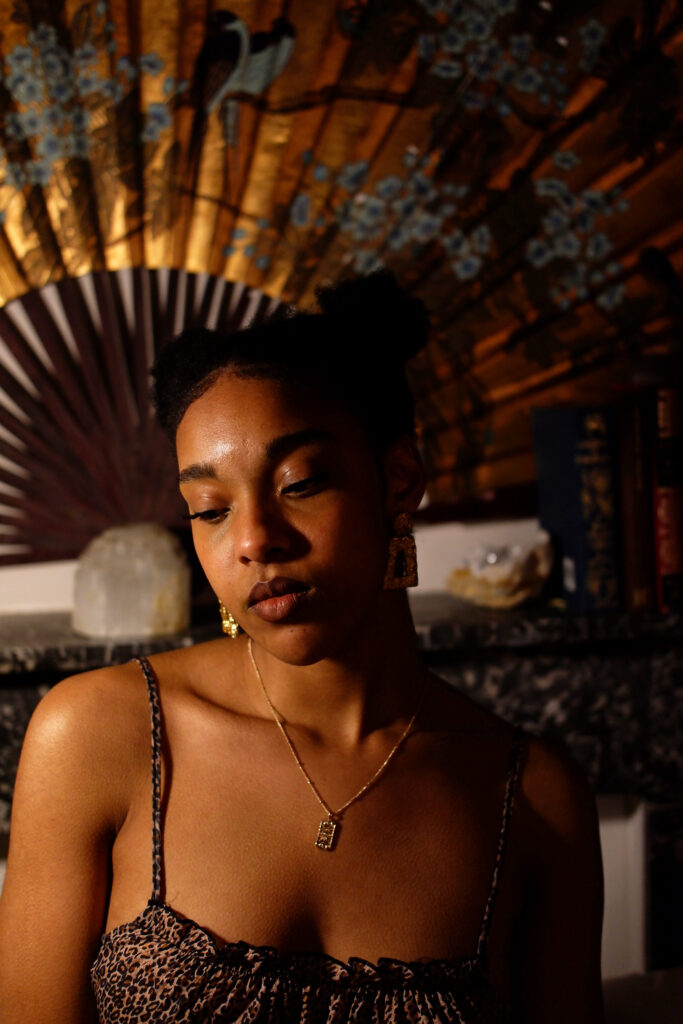
You mentioned the vulnerability that comes with singing in your native language. Do you usually write your songs in French or in English? Is there a language in which writing comes easier to you?
For songs, I do it in English, but the poems I write are in French. I don’t actually listen to a lot of music in French and I feel like, whenever I write in French, it always sounds like something I’ve heard before, like M Pokora (back in 2007), and then if I do something more dancy, suddenly it feels like I’m copying Angèle and I don’t like feeling that way. I want my songs to be catchy without sounding like something people have heard a million times already. In reality, it’s something I still need to unlock in myself. Maybe, if there is nothing in French music that speaks to me at the moment, my ambition should be to create something new.
What kind of challenges do you face?
The biggest challenge for me right now is to deliver a finished product [laughs] because finishing one song is “easy” but having a whole project ready is quite difficult. The idea of a project being considered “finished” and won’t be changed anymore is scary to me because deep down, it will never feel absolutely perfect and there is always room for improvement. So, when do I decide that a project is good enough to be released ? My competences are still rather limited so the desired level of perfection is unattainable, and I have to convince myself that what I do may not be perfect, but that’s okay!
On stage, the biggest difficulty for me is the guitar playing. I have this big imposteur syndrome because I’ve been playing for a while but I’m just learning through tutorials and through practicing various chords. If you ask me about musical theory, or to play a scale, I’m lost [laughs]. I’m not a guitarist, it’s more of a small addition to my voice. But, when I step on stage with a guitar, I have this fear that people will expect some amazing playing. Whenever I pull out my guitar for my first song, my hands are shaky and it becomes a challenge for me to fully claim the space.
Do you feel that, as a black artist, things are more complicated ?
I’ve felt a difference once in Flanders, when I was performing at university alongside another woman, who is white. The treatment we received was not vastly different but the questions that we got asked afterwards were. She received compliments on her voice, questions about her music whereas I got asked things like “Where do you come from ?” or “Are you trying to connect to your roots through music?” It was more the typical normalized racism, in a way.
I haven’t been performing for long so maybe it explains why I haven’t yet received the kind of discriminatory comments that bigger artists regularly receive. But, it’s sort of inevitable. I may not have experienced it here, in Brussels, but maybe I will someday, or I will in another city. I expect it and I try to prepare myself mentally for that.
I’m also expected to tap into certain genres just because I’m half-black. The audience expects me to have a voice that “sounds black”, that is warm and that fits soul music. And I do perform soul music, because I love it so much, but that’s not all I do.
I’m compared to artists like Jorja Smith, simply because we share a vague resemblance. Because of that, there are certain genres that I shy away from, so as to not fall into clichés. I feel like these spaces are already so full of amazing artists that I would endlessly be compared to. I do not want this for myself. Even from a marketing viewpoint, it’s not the smartest move. I would probably feel the pressure of having to be better than them. So, I might as well go into a genre that I love just as much and where I have more freedom to create my own thing.
What are your musical influences?
Etta James, Lauryn Hill, Ella Fitzgerald, Jorja Smith, Little Simz. It’s very soul, jazz, hip-hop. And then of course, the iconic singers of my childhood: Whitney, Mariah; their songs are always playing in the back of my head, their powerful singing and I keep telling myself “Just hold on, someday I’ll sing just as loud and just as powerfully as them. I’m working on it.”
I also really love artists like FKJ, and especially the instrumental work in their songs which I sometimes admire even more than the singing itself. That’s really the kind of music that I strive to make.
There is a band called Jungle, which I’ve discovered recently. It’s got this funky and disco vibe that I want to lean towards as well. That’s a repertoire which I’ve started to sing thanks to university: Earth, Wind and Fire, Prince and also Stevie Wonder. I found it so incredible and I thought “Oh my god, why did I not listen to this more often before?” I had always been interested in funk, with Curtis Mayfield, for example, but now I have this newfound love for disco. We have to really bring it back to the forefront, you know!
Oh and also Harry Styles. Which is again a whole different genre [laughs]. He’s one of the only artists where I consider all of his albums to be no-skippers. Once a Directioner, always a Directioner, I guess!
But since we were talking about my identity earlier on, I also want to bring up another musical influence. My dad used to listen to a lot of Congolese music when I was little, and the guitar in those songs is incredible. Their way of playing is so beautiful, and it’s something I’d like to incorporate into my music because it’s also a genre that has influenced me, a music I’ve danced to a lot. I know that one day I want to go there and learn the music because I know that the approach to music is very different there.
Is your music out anywhere?
No, it’s live exclusives only [laughs]. I used to release it on soundcloud but I since deleted them from the platform. I also post bits and pieces in my Instagram highlights. At the moment, you have to catch me at one of my live performances.
And when is your next gig?
On the 10th of May, 2024, at Jardin Hospice, I will take part in the event Sound and Soul, which aims to promote POC artists. The event will include concerts and art exhibitions.
And do you know when you will release your first EP?
I’m not going to announce any dates yet, because people would hold me to my word [laughs]. I’ve told myself to work on it with the goal of releasing it in June but it could very well be in September. I want to finalize it and maybe work on the visuals during the summer. So the recorded music in itself should be ready by June.
Will you release all of it at once? Without releasing a single first?
There will be a single and this is why I have to plan the release for a bit later. I imagined the EP as a vinyl, with two sides. Side A will be chill and cozy, tapping into soul music. Side B will be more upbeat. It’s representative of the grieving process after a breakup. I would like to release a single of side A and one of side B before the release of the whole EP. What I can tell you, is that it will be out before 2024 ends.
Have you chosen a stage name yet?
I’m giving myself time to develop the project and see if I adopt an artist name because I believe it could enhance my presence during performances. When I was involved in theater, I felt comfortable moving around and speaking freely; there were no inhibitions. However, when I sing, I find it a bit challenging to fully occupy the stage. I’ll move, but within a confined space. So, I’ve been contemplating the idea of taking on a stage name to embody a role separate from my everyday self.
But, I’m also hesitant because once you have a name, it becomes fixed, and I’m not keen on changing names every two months [laughs] So, for now, I’ve decided to stick with the security of my given name because it’s unlikely to change. However, don’t be surprised if my stage name pops up when the EP is released, or if you happen to notice a name change on Instagram!
Additionally, it’s essential to consider how the name sounds in different languages. My own name is a bit tricky for some people. And then, a friend and I imagined a scenario where the crowd chants my name like “E-manu-elle,” and they must think, “Gosh, that’s long!” So, a stage name would be beneficial, but it needs to be chosen wisely.
Have you collaborated with other artists before ?
Yes, mainly with rappers to provide backing vocals. Recently I collaborated with Imani (@joyeuse.ruzibiza), whom I didn’t know personally; we just followed each other on Instagram. She proposed that we work on a song together, so we got together, jammed a bit, and she’s currently shared a teaser of the song on Instagram. On that track, I played the guitar and provided some backing vocals also. So, for me, collaborations usually unfold like that, or with producers, such as the pianist I perform with.
I’m open to collaborations, but I don’t want to be the kind of artist who releases a million collabs before putting out her own project. I’m trying to focus more on that at the moment, but doing some backing vocals here and there isn’t an issue. However, I do prefer to establish my own artistic univers before being associated with a multitude of projects.
Do you consciously include parts of your identity in your music or is it more of an unconscious process? Are there revendications in your music?
It’s not entirely conscious yet; I don’t really write conscious songs. But I definitely want to express more than just my emotions. I find it easier to do so in my poetry because the texts are more politically engaged. However, I believe music is such a beautiful medium for this expression.
Still, I struggle a bit with it, because I feel as though I’m not legitimate enough to speak on certain matters. As a mixed-race person, I know that some people have different struggles, experiences I haven’t lived through because I’m lightskinned, and I don’t feel it’s my place to address them. There are causes that deeply touch me, but at the same time, I haven’t experienced them, so I’m unsure if I should address them. So, it’s still something I handle cautiously. I definitely have the desire to talk about these issues and represent as much as possible, but I just want to do it justice, and I’m not sure how yet, so I refrain from doing so.
Have you performed your poetry before? And if yes, you mentioned feeling vulnerable when performing your songs on stage, is it the same with your poetry?
Yes, it’s even more intense. The first time, I almost cried, but it was an incredible moment in my life. It’s intense but really cool. But there is a bit of a difference between poetry and music, since with poetry, people are actually listening to every word you say, whereas with music the audience is primarily vibing.
Would you agree that with poetry, people already expect vulnerability, whereas with music, perhaps not as much? Is the focus more on the instrumental?
Yes, I feel that that’s the case. Also, with poetry, I can see the audience’s reactions. You can tell when someone relates to what you’re saying, like when I talk about loneliness, a woman’s place, the concept of beauty, etc. These are emotions people can relate to. I directly see the reactions of those who have experienced it. And for me, it’s hugely therapeutic because you’re putting words to something many people experience, and having that feedback from people who couldn’t articulate what they felt is great. In fact, we’re not alone. And even in music, it’s the same; I love putting words to something that someone might be feeling.
What would be the ideal stage for you to perform on? You can aim big.
The Antwerp Sportpaleis, because the sound is better than at the stadium. I’ve seen so many concerts there, and they were truly dreamy.
And if you had to choose a stage to start?
Botanique, where the audience is close to you, all around the stage; it’s super intimate. Since I perform with a band, it would be great! Then there’s Beursschouwburg. It’s cute, intimate, but spacious. And then, obviously, there’s the Jardin Hospice. I admit I shed a tear when I found out I was going to perform there because last September, I attended a concert there and I said to myself that one day I would perform there too. When I received the email, I thought, “Oh my God, it’s happening! Maybe I should manifest things more!” [laughs]
As Emmanuelle continues to pursue her passion, blending influences from her diverse background and musical inspirations, she remains steadfast in her pursuit of authenticity, ready to share her soulful melodies with the world.
You may also like
-
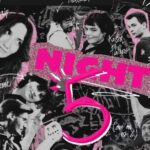
NIGHT 5: The Official Kickoff to Festival Season in Brussels!
Get ready to ignite your summer—NIGHT 5 is here to launch the festival season with
-

Why Staying in Brussels in July Is Absolutely Brilliant
In partnership with Visit.brussels If you think summer in Brussels means empty streets and closed
-
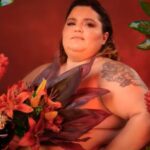
Barbara Butch: The Trailblazing DJ Who Turned the World’s Stage into a Celebration of Diversity
Meet Barbara Butch, the French DJ, activist, and cultural icon who’s been spinning more than
-
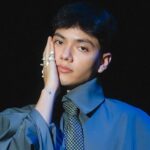
Interview with JJ, Eurovision 2025 Winner: “Live Each Day with Pride, Because We Are Unstoppable”
With his “pop opera”—as he defines his music—JJ brought victory to Austria at the recent
-
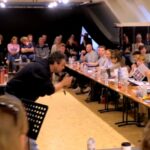
Two Sensational New Musicals Set to Shine at Bruxellons Festival
This summer, the Bruxellons Festival is gearing up to present two extraordinary musical premieres, each

